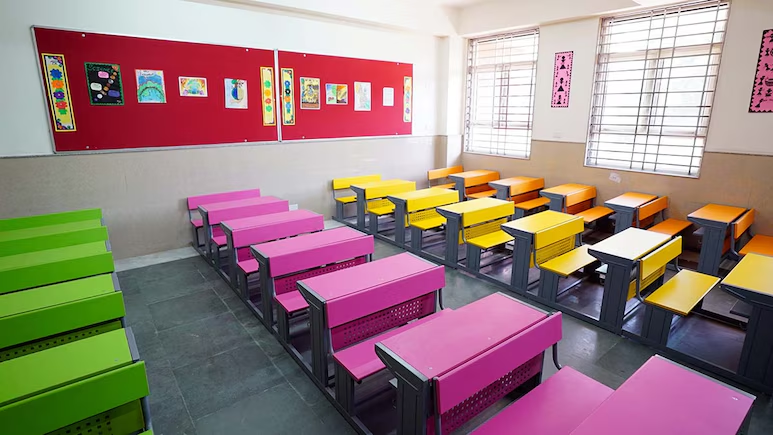
The University Grants Commission (UGC) has issued a slew of guidelines for the reopening of universities and colleges (UGC guidelines 2020) across the nation. These UGC guidelines have been approved by the Ministry of Home Affairs and the Ministry of Education. These guidelines are to be adopted by the universities and colleges as per the local conditions in the wake of COVID-19 pandemic.
UGC has suggested universities and colleges reduce the class size and break them in multiple sections to maintain physical distancing during the classes. The Commission also allows increasing the teaching hours in a day as per requirements of the institution.
“Six-day schedule may be followed so that classes can be conducted in phases and the seating arrangement be made keeping in view the requirements of physical distancing. Depending on the availability of space in classrooms or learning sites, up to 50% of students may be allowed on a rotation basis to attend the classes,” read the official notification.
|| Read More UGC Issues Guidelines On Reopening Universities, Colleges In Phases ||
As per the UGC directive, the universities and colleges which do not fall in the containment zones will be allowed to reopen in a graded manner after consultations with concerned State/UT Governments.
|| Also Read Set Up Anti-Ragging Mechanisms: UGC To Institutions To Curb Menace Of Ragging ||
Following safety measures are to be enforced by the institutions as per the UGC guidelines:
At Entry And Exit Point
1- Crowding must be avoided at entry/ exit points. Staggered timings of entry and exit with limited strength for different programmes should be followed.
2- For ensuring queue management, inside and outside the premises, specific markings on the floor with a gap of 6 feet may be made and be adhered to.
3- Screening of students, faculty and staff, wearing of face covers/ mask, sanitizing of hands etc. must be ensured at all entry points.
Safety Measures In Classroom
1- Proper sanitization at all learning sites should be ensured. Cleaning and regular disinfection of frequently touched surfaces (doorknobs, elevator buttons, handrails, chairs, benches, washroom fixtures, etc.) to be made mandatory in all classrooms, laboratories, (and also) lockers, parking areas, other common areas etc. before the beginning of classes and at the end of the day. Teaching materials, computers, laptops, printers, shall be regularly disinfected with 70% alcohol swipe.
2- Sitting places in classes, laboratories, computer labs, libraries etc. should be clearly marked, keeping in view the norms of physical distancing. At least one seat should be left vacant between two seats.
Inside The Campus
1- Cultural activities, meeting etc. has to be avoided. However, such extra-curricular and sports activities may be allowed where physical distancing is feasible.
2- Dustbin for collection of used face masks, personal protective equipment, hand gloves and their disposals should be ensured as per safety norms. Provision for proper disposal of used personal protection items and general waste should be followed in accordance with CPCB guidelines.
3- Gymnasiums will be allowed to open amid certain restrictions, however, Swimming Pools will remain closed.
Hostels
1- Hostels may be opened only in such cases where it is necessary while strictly observing the safety and health preventive measures. However, the sharing of rooms may not be allowed in hostels. Symptomatic students should not be permitted to stay in the hostels under any circumstances.
2- Since residential students may be coming from different locations, they shall remain in quarantine and self-monitor their health for a period of 14 days before being allowed to attend classes or as per the policy opted by the respective State Government for quarantine.
3- There should be no crowding in hostel areas where students live in close proximity and share common facilities and utilities. Hence, their numbers need to be limited appropriately to avoid crowding. Also, hostel students should be called in phases.
4- Cleanliness is to be maintained in dining areas. Meals should be served in small batches, avoiding over-crowding. Take away options should be available for students and staff.
